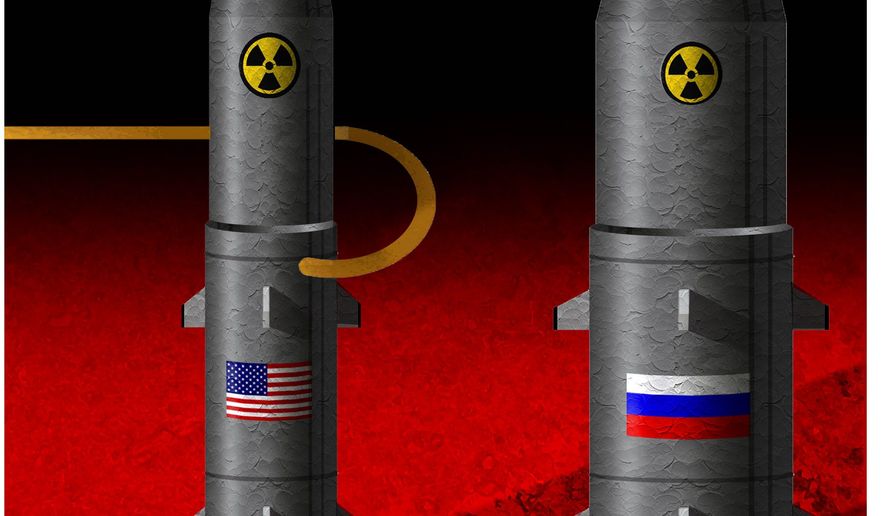OPINION:
President Trump’s decision to withdraw the United States from the Intermediate-Range Nuclear Forces Treaty (INF), signed in 1987 by President Reagan and Soviet leader Mikhail Gorbachev, seems to have surprised Russia President Vladimir Putin. However, it should not have come as a shock.
Moscow began violating the INF Treaty at least 10 years ago. Much like the North Atlantic Treaty Organization (NATO), the INF was on life support during most of President Obama’s term in office. President Trump simply pulled the plug.
On the other hand, Mr. Putin’s response to Mr. Trump’s actions included a statement that deserves more attention than it has received: Russia would only employ its nuclear weapons in response to an incoming missile attack. In other words, like China, Mr. Putin is declaring a “No First Use” Doctrine for Russian nuclear weapons.
To the casual Western observer, Mr. Putin’s posture is confusing. In one breath, Moscow threatens Washington’s European allies with grave consequences if they host a new class of U.S. nuclear weapons designed to counter Russia’s capabilities, and in the next breath Mr. Putin denies that Moscow will ever be the first to use a nuclear weapon. What’s going on?
The answer is complex. Unfortunately, Washington’s current relations with Moscow are weighed down by the burden of history.
During the 1930s and World War II, FDR believed that he and Stalin could solve any problem on a “man-to-man” basis. “Of one thing I am sure,” said FDR, “Stalin is not an imperialist.” Stalin “played” FDR. Fortunately, when the war ended with half of Europe and Asia under Stalin’s boot, George Kennan’s long-standing warnings about the Soviet threat finally found a receptive audience in President Truman.
Mr. Truman accepted Mr. Kennan’s argument that Moscow’s power depended on a siege mentality inside Russian society that necessitated an enemy perpetually “lowering beyond the walls.” But Stalin’s ostensible support for North Korea’s attack on South Korea set destructive forces in motion that would not expire until 1989.
With this point in mind, Steven Cohen, professor emeritus of Russian Studies at Princeton University, sought to dismantle the Cold War perception of contemporary Russia by “humanizing” Russia’s president. Mr. Cohen said, “Putin is not the ever-’aggressive Kremlin autocrat’ so often portrayed in U.S. mainstream media. A moderate by nature (in the Russian context), he governs by balancing powerful conflicting groups and interests.”
Mr. Cohen has a point. Mr. Putin is not the mass murderer Joseph Stalin was and Russia is no longer a major superpower. In 2016, the size of the Russian economy was roughly 85 percent that of the South Korean economy. Put another way, 49 million Koreans in the Republic of Korea (ROK) dramatically out-performed 140 million Russians.
Thanks to this year’s modest rise in oil and gas prices, Russia’s single commodity economy looks a bit more robust, but in terms of per capita GDP, Russia still comes in at 68th in the world — whereas the ROK is roughly 22nd. However, today’s Japanese economy is actually more than three times the size of the ROK’s economy. Given Russia’s difficult history with Japan, Japan’s economic superpower status must raise new fears in Moscow.
Following a successful October meeting between President Xi Jinping and Japanese Prime Minister Shinzo Abe, it was announced that China’s bilateral relationship with Japan is back on the right track and showing positive momentum. In a joint press conference held after the talks, Mr. Abe said, “We confirmed the principle of being cooperative partners and not becoming threats to each other.” This must trouble Moscow.
The shared fear of mutually assured destruction induces Moscow to refrain from the use of nuclear weapons, but this limitation does not equate to fundamental change in Moscow’s view of itself and the surrounding world.
Though Washington dislikes and genuinely fears the concentration of Russian political, economic and military power, Washington has no choice but to deal with Moscow’s bipolar tendencies; to seek acceptance one day, then, engage in risky international behavior on the next. Keep in mind, Mr. Putin says he is ready for an improvement in U.S.-Russian ties “at any moment.”
Yet, relations with Russia now are no more about Mr. Trump’s personal rapport with Mr. Putin than were FDR’s relations with Stalin. International relations are about interests. To paraphrase George Kennan, when Mr. Trump meets with Mr. Putin in Paris on Nov. 11, his approach must be that of a long-term, patient — but firm — commitment to identify and build on the interests that Washington and Moscow share, but to scrupulously avoid the trap that ensnared FDR.
• Douglas Macgregor, a retired U.S. Army colonel, is a decorated combat veteran and the author of five books. His latest is “Margin of Victory” (Naval Institute Press, 2016).




Please read our comment policy before commenting.